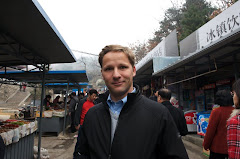The Movie "21 - The movie" references my employer at the beginning.
Thursday, July 24, 2008
Saturday, July 19, 2008
Sunday, July 13, 2008
Authors@Google: Dan Ariely
I missed Dan Ariely but thankfully his presentation at Google was recorded on YouTube.
Sunday, July 06, 2008
Why Free! is great

Have you ever grabbed for a coupon offering a free! package of coffee beans—even though you don’t drink coffee and don’t even have a machine with which to brew it? What about all those free! extra helpings you piled on your plate at a buffet, even though your stomach had already started to ache from all the food you had consumed? And what about the worthless free! stuff you’ve accumulated—the promotional T-shirt from the radio station, the teddy bear that came with the box of Valentine chocolates, the magnetic calendar your insurance agent sends you each year?
It’s no secret that getting something free feels very good. Zero is not just another price, it turns out. Zero is an emotional hot button—a source of irrational excitement. Would you buy something if it were discounted from 50 cents to 20 cents? Maybe. Would you buy it if it were discounted from 50 cents to two cents? Maybe. Would you grab it if it were discounted from 50 cents to zero? You bet!
What is it about zero cost that we find so irresistible? Why does free! make us so happy? After all, free! can lead us into trouble: things that we would never consider purchasing become incredibly appealing as soon as they are free! For instance, have you ever gathered up free pencils, key chains, and note pads at a conference, even though you’d have to carry them home and would only throw most of them away? Have you ever stood in line for a very long time (too long), just to get a free cone of Ben and Jerry’s ice cream? Or have you bought two of a product that you wouldn’t have chosen in the first place, just to get the third one for free?
What is it about free! that’s so enticing? Why do we have an irrational urge to jump for a free! item, even when it’s not what we really want?
I believe the answer is this. Most transactions have an upside and a downside, but when something is free! we forget the downside. Free! gives us such an emotional charge
that we perceive what is being offered as immensely more valuable than it really is. Why? I think it’s because humans are intrinsically afraid of loss. The real allure of free! is tied to this fear. There’s no visible possibility of loss when we choose a free! item (it’s free). But suppose we choose the item that’s not free. Uh- oh, now there’s a risk of having made a poor decision—the possibility of a loss. And so, given the choice, we go for what is free.
Source: Daniel Ariery, http://g-ecx.images-amazon.com/images/G/01/books/a-plus/Predictably-Irrational-Excerpt.pdf
Online Dating & Disappointments
Daniel Ariely is closing the gap on why we are more disappointed the more we know about a person.
Friday, July 04, 2008
Subscribe to:
Posts (Atom)


